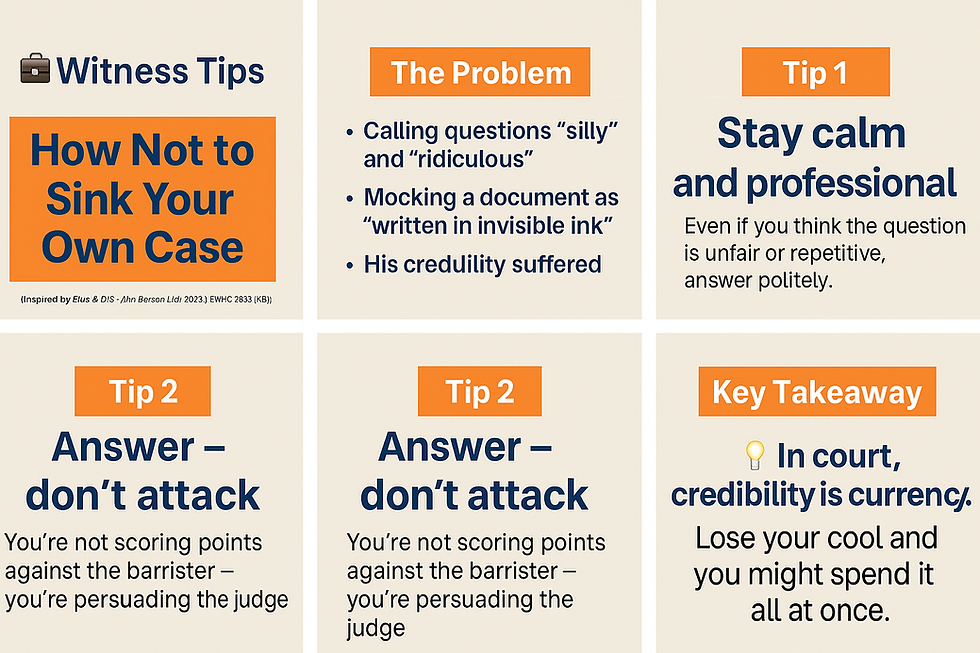How to give evidence..and how not to
- Peter Causton
- Aug 10, 2025
- 2 min read
Courtroom Conduct: Why Aggression Can Backfire for Witnesses

In litigation, witness evidence is not judged solely on what is said but also on how it is said. The recent High Court case of Ellis & Ors v John Benson Ltd [2025] EWHC 2096 (KB) offers a textbook example of how an aggressive approach under cross-examination can undermine credibility and harm a party’s case.
The Case Background
The dispute involved a group of former driving school franchisees alleging that the franchisor, Mr John Benson, had created an abusive and intimidating working environment. Mr Benson was the main witness for the Defendant. While parts of his evidence were described as “charming and cooperative,” much of it was “aggressive and sarcastic,” according to Mr Justice Freedman .
Examples of Damaging Courtroom Conduct
Over 3.5 days in the witness box, Mr Benson repeatedly:
Responded to repeated questions with dismissive remarks such as “For the third time, I have explained it” and “I’ve already told you that a few minutes ago”.
Made personal digs at opposing counsel, including “the word ‘threat’ which you love, Mr Stephens” and sarcastic comments about documents being “written in invisible ink.”
Labelled questions “silly,” “ridiculous,” “nonsense,” and “absurd.”
Adopted an openly confrontational tone designed, in the judge’s view, to “undermine counsel” and showing “disrespect… to the process” .
This behaviour did not impress the court. On the contrary, it supported the franchisees’ case that Mr Benson was overbearing and intimidating in his dealings — exactly the character traits they alleged had made working for him intolerable.
Why This Approach Failed
The judgment makes clear that:
Tone matters – Even if a witness believes questions are repetitive or unfair, dismissiveness can be interpreted as hostility rather than confidence.
Hostility feeds the other side’s case – The judge expressly linked Mr Benson’s courtroom manner to the alleged workplace conduct, finding it “telling” that he behaved this way in a formal setting.
Attacks on counsel are counterproductive – The court noted the resilience of the cross-examiner, but the aggressive tone harmed Mr Benson’s own credibility.
Perceived arrogance damages reliability – The judge said the “strength of the denials” did not make them more plausible; instead, they made them less convincing .
Best Practice for Witnesses Under Cross-Examination
Drawing lessons from this case:
Stay Calm and Respectful – Even under pressure, address the question without attacking the questioner.
Answer the Question Asked – Avoid sarcasm or commentary on the fairness of the question; stick to facts.
Don’t Argue with Counsel – The judge, not the witness, is the audience that matters.
Avoid Repetition and Overstatement – Overly emphatic denials can look defensive rather than persuasive.
Remember the Bigger Picture – Your demeanour in court can be taken as evidence of your conduct outside it.
Key Takeaway
Court is not a place to score points against the opposing barrister. A witness who is combative or sarcastic risks turning the judge against them, even if they believe they are “winning” the exchange. As Ellis v Benson demonstrates, aggressive courtroom conduct can not only weaken your evidence but actively support the other side’s case.


Comments